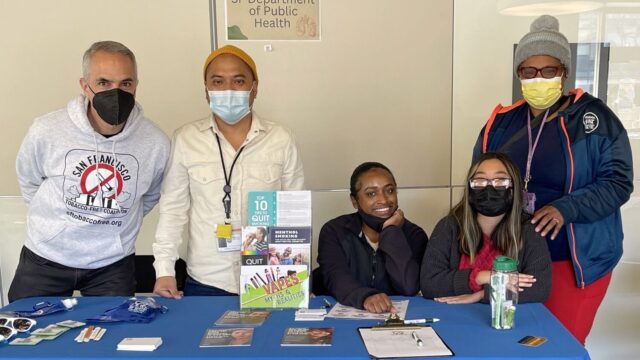BCHC recommends reducing barriers to over-the-counter preventive services to advance equity
December 2023

The Big Cities Health Coalition has responded to a Request for Information (RFI) from the Internal Revenue Service, Department of the Treasury, Department of Labor, and Department of Health and Human Services regarding the Coverage of Over-the-Counter Preventive Services.
BCHC offers the following recommendations on select health care access and over-the-counter (OTC) implementation considerations, informed by our members’ on-the-ground experience in their communities across the country.
Nicotine Replacement (NRT) Products
We support the Departments’ intent to reduce and eliminate barriers to OTC NRTs, which would increase access to effective tobacco cessation medications for adults who want to quit tobacco. Requiring health plans and insurers to cover effective OTC NRT without cost sharing or a prescription will encourage more widespread use of approved medications for adults who use tobacco to quit.
Reducing barriers to accessing FDA-approved cessation medications for individuals who use tobacco products and want to quit is considered the gold standard of health cost effectiveness because the benefits outweigh the costs. Evidence shows that access to comprehensive tobacco cessation benefits help people quit smoking and that quit rates are higher when health insurance covers this benefit.
Reproductive Health Products
Contraception, including OTC, is a critical preventive health service, essential in individuals’ achievement of their health and prosperity. The Affordable Care Act (ACA) greatly advanced access to contraception, among other preventive services, partially rectifying long standing disparities. Affordable access to birth control can mean the difference between people getting their desired method and going without. Research shows that interest in OTC contraceptives, particularly birth control pills, increases if they are covered by insurance. At this critical juncture, the Administration can take action to reduce barriers and realize the potential of OTC contraception by fully implementing the preventive service requirement and requiring health plans to cover OTC contraception without a prescription and without cost sharing.
The Departments are also to be commended for considering reproductive health protections and options across the spectrum of outcomes. Access to breastfeeding care and supports is also essential to advancing health equity. While nearly all people who give birth in the U.S. plan to breastfeed, too few meet their breastfeeding goals or have the supports to try. Black and Indigenous people are the least likely to meet breastfeeding goals and rarely continue providing human milk to their babies as long as they planned. Ensuring that breast pumps and other breastfeeding supplies are available OTC and without a prescription will be a major contributor to eliminating disparities in birth and breastfeeding outcomes.
Overall Implementation
We recommend the following –
- The Departments should require that patient attestation alone is sufficient to receive eligible preventive OTC products and services.
- Providers may not have the bandwidth to go through the administrative complexities of health plans and federal policies. We urge the Departments to make processes as simple as possible by allowing providers to recommend products available OTC with confidence that their recommendation will not create cost burdens or other barriers for their patients.
- Pharmacy tools that enable prescription medication without paying out of pocket should be turned on to allow OTC medications to be charged to health plans.
- When people buy contraception off the shelf, for example, outside of pharmacy hours or from retailers not connected to pharmacy systems (like convenience stores or online retail), there must be an easy, fast, and consistent way to obtain reimbursement from insurers.
- An EBT or debit card issued by insurance plans, similar to health savings account or SNAP benefit cards, will prevent out-of-pocket expenses for consumers when they purchase eligible OTC products from cashiers not connected to pharmacy systems. These solutions could also be leveraged for the growing market of OTC products that could be covered by insurance, such as COVID tests, Narcan, folic acid, and NRT.
- Collaborate with providers, pharmacies, health plans, governmental public health, and other stakeholders to streamline access to OTC products.
- Local and tribal public health entities, not just states, must have adequate resources to continue to provide access to essential preventive care, services, and products, including:
Communicating with Providers and the Public
- Inform beneficiaries, providers, pharmacists/pharmacy staff, and other stakeholders about changes in coverage of OTC products that no longer require a prescription.
- Create and disseminate public education materials – and/or partner with trusted messengers – to inform consumers of covered OTC products. Materials should be available in multiple languages, at an elementary reading level, and provide consumers with resources such as a hotline or FAQs to help address questions they may have.
- Offer timely, consistent guidance on how to facilitate claims processing and reimbursement.
- Provide education materials to be distributed to all major retail and online pharmacies as well as networks of independent pharmacies, including information about covered OTC products and where pharmacies can direct consumers for more information about payment and reimbursement for such OTC products. These could include posters to be displayed in pharmacy break rooms and other mechanisms for sharing new information with the pharmacy community, including presenting at conferences.
- Provide educational materials about covered preventive OTC products for the full range of providers who offer contraceptive care, tobacco and smoking cessation care/services, reproductive health and peripartum care/services and the avenues by which payment and reimbursement can occur.
Evaluation and Continuous Quality Improvement (CQI)
- The Departments must vigilantly oversee and enforce every aspect of coverage and reimbursement for preventive OTC products without a prescription and health plan compliance. The Departments must also ensure that CQI and oversight do not add administrative/point-of-sale burden for patients.
- HHS should ensure adequate resources to understand community-level impact of access to preventive OTC products. Resources for local public health and relationship building at the local level could allow the following data to become more accessible and actionable:
Read the full document
Download now Read the full document

